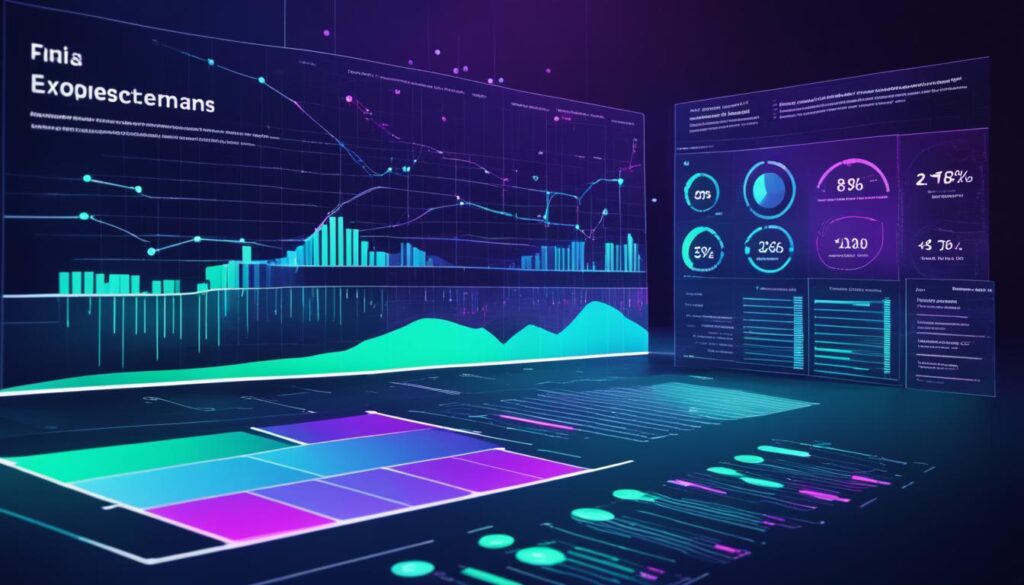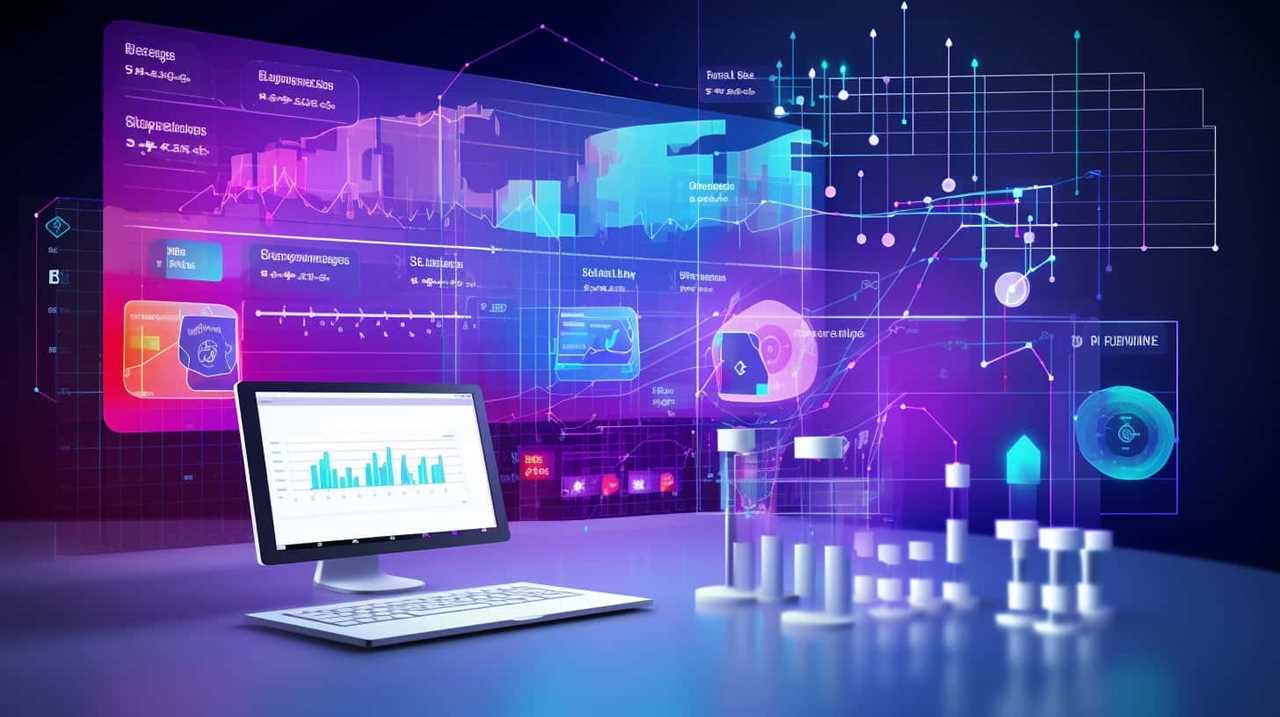Did you know that the marketing industry is on the verge of a significant transformation due to artificial intelligence (AI)? With its advanced technology and capabilities, AI is changing traditional marketing tactics, allowing for customization, and improving results. By analyzing vast amounts of data and optimizing processes, AI is reshaping the marketing landscape and offering exciting opportunities for growth.
Key Takeaways:
- AI is revolutionizing the marketing industry, offering advanced technology and capabilities.
- Marketers can leverage AI to analyze data, personalize campaigns, and automate processes.
- AI-driven strategies empower marketers to stay competitive and drive better results.
- Despite the challenges, the benefits of AI in marketing are immense and worth embracing.
- The future of marketing is intricately tied to AI, and those who embrace it will thrive.
The Power of AI in Marketing
In today’s rapidly evolving digital landscape, artificial intelligence (AI) has emerged as a powerful tool for marketers. Its role in marketing goes beyond the mere automation of tasks, extending to the analysis of vast amounts of data, predicting trends, and personalizing marketing campaigns. By leveraging AI-driven strategies, marketers can optimize their efforts, enhance customer engagement, and drive higher return on investment (ROI).
One of the key applications of AI in marketing is its ability to analyze data. By using advanced algorithms and machine learning techniques, AI can sift through enormous volumes of data to identify patterns, trends, and correlations that would be virtually impossible for humans to detect. This allows marketers to gain valuable insights into customer behavior, preferences, and purchasing patterns.
With these insights, businesses can develop highly targeted, personalized marketing campaigns. By understanding their customers on a deeper level, marketers can tailor their messaging, offers, and recommendations to resonate with individual preferences and needs. This level of personalization not only enhances customer experience but also improves the likelihood of conversions and customer loyalty.
“The ability to predict trends is another powerful application of AI in marketing.”
AI-powered algorithms can analyze historical data and current market trends to make accurate predictions about future consumer behavior. This enables marketers to proactively adjust their strategies, anticipate market demands, and stay ahead of the competition. By leveraging AI’s predictive capabilities, businesses can make informed decisions regarding product development, pricing, inventory management, and marketing campaigns.
Furthermore, AI can help marketers optimize their marketing efforts. By automating repetitive tasks such as data analysis, reporting, and campaign optimization, marketers can save time and allocate their resources more efficiently. This allows them to focus on higher-value activities such as strategy development, creativity, and customer relationship management.
Harnessing the power of AI in marketing is not only about staying ahead of industry trends but also about delivering more effective campaigns. By leveraging AI-driven strategies, businesses can enhance customer targeting, improve campaign performance, and achieve higher ROI. In an increasingly competitive marketplace, AI is no longer a luxury but a necessity for marketers who want to thrive in the digital age.
Discover the full potential of AI in marketing by implementing AI strategies that align with your business goals and customer needs. Invest in AI-powered tools, platforms, and solutions that can support your marketing efforts and unlock new opportunities for growth. By embracing the power of AI, marketers can navigate the evolving landscape, drive better outcomes, and truly make an impact in the market.
“AI in marketing: Harness the power of artificial intelligence to optimize your strategies, drive engagement, and achieve better results.”
AI in Action: Real-World Examples
AI has already revolutionized the marketing industry, with companies like Facebook, Google, Netflix, and Amazon leading the way. They have harnessed the power of AI to optimize their marketing efforts and deliver exceptional results. Through AI-powered tools and technologies, these companies have been able to create personalized experiences, automate marketing processes, and enhance their advertising campaigns.

Machine learning, a subset of AI, plays a crucial role in analyzing vast amounts of data and providing actionable insights. With machine learning algorithms, marketers can uncover patterns, predict customer behavior, and make data-driven marketing decisions.
“AI allows us to unlock the full potential of our marketing strategies. It enables us to understand our customers better and deliver personalized experiences at scale.” – Marketing Director, Amazon
AI marketing strategies have brought significant advancements to the industry. By leveraging AI, marketers can automate repetitive tasks, save time, and enhance their efficiency. This allows them to focus on strategic thinking and developing creative campaigns that resonate with their target audience.
Moreover, data-driven marketing with AI has become a game-changer. By harnessing the power of data and AI-driven insights, marketers can refine their targeting, optimize campaigns, and improve overall marketing performance. Through thoughtful analysis of customer data, marketers can develop highly targeted and personalized marketing strategies that drive customer engagement and boost ROI.
Additionally, AI advertising has emerged as a powerful tool in the marketing arsenal. By leveraging AI, marketers can deliver more relevant and personalized ads to their target audience. AI advertising platforms use sophisticated algorithms to analyze user behavior, interests, and preferences, allowing marketers to create highly tailored ad campaigns that maximize impact.
Real-World Examples of AI in Marketing
Let’s take a closer look at some real-world examples of AI in action:
| Company | AI Marketing Tool/Software | Application |
|---|---|---|
| Facebook Ads Manager | AI-powered ad targeting and optimization | |
| Google Analytics | AI-driven data analysis and insights | |
| Netflix | Recommendation algorithm | Personalized content recommendations |
| Amazon | Amazon Personalize | Dynamic product recommendations |
The Benefits of AI in Marketing
Artificial intelligence (AI) has emerged as a game-changer in the marketing industry, offering a wide range of benefits for businesses. By harnessing the power of AI, marketers can revolutionize their strategies and drive better results. Let’s dive into some of the key advantages of AI in marketing:
1. Personalized Customer Experiences
One of the greatest advantages of AI in marketing is the ability to deliver personalized customer experiences. AI algorithms analyze vast amounts of data, allowing marketers to understand individual preferences, behaviors, and needs. With this insight, marketers can create highly targeted and personalized campaigns that resonate with their audience, leading to increased engagement and conversion rates.
2. Optimized Marketing Strategies
AI-driven marketing strategies empower marketers to optimize their approaches and make data-driven decisions. Predictive analytics, a key component of AI, enables marketers to forecast trends, identify patterns, and anticipate customer behaviors. By leveraging these insights, marketers can fine-tune their strategies, allocate resources effectively, and target their efforts where they are most likely to yield positive outcomes.
3. Automation and Efficiency
Automation is another significant benefit of AI in marketing. AI-powered tools and platforms can automate repetitive tasks, freeing up time for marketers to focus on more strategic initiatives. From email marketing and social media scheduling to content creation and lead nurturing, AI streamlines processes, enhances efficiency, and improves overall productivity.

4. Enhanced Engagement
AI technologies enable marketers to engage with their audience in a more meaningful and impactful way. Chatbots and virtual assistants powered by AI can provide instant customer support, answer queries, and even offer personalized recommendations, enhancing the overall customer experience. By leveraging AI to deliver timely and relevant content, marketers can nurture customer relationships and build long-term loyalty.
5. Predictive Analytics for Strategic Decision-Making
Predictive analytics, powered by AI, allows marketers to make informed and strategic decisions. By analyzing historical data and identifying trends, marketers gain valuable insights into customer preferences and market dynamics. With this foresight, marketers can adapt their strategies, anticipate shifts in demand, and stay ahead of the competition.
6. Improved ROI
Ultimately, AI helps marketers improve their return on investment (ROI). By delivering personalized experiences, optimizing strategies, automating processes, enhancing engagement, and making data-driven decisions, marketers can maximize their marketing efforts and achieve better results. With AI, marketers can allocate their resources effectively, optimizing their budget and driving higher ROI for their marketing campaigns.
As technology continues to advance, it is clear that AI is transforming the marketing landscape. Marketers who embrace AI-driven strategies and leverage the power of predictive analytics, automation, and personalization will stay ahead of the curve and unlock the full potential of their marketing efforts.
Overcoming Challenges and Obstacles
While AI brings immense potential to the marketing industry, it also presents challenges and obstacles that need to be addressed. One major concern is the fear of marketing job cuts and job losses due to automation. However, it’s important to note that AI is expected to transform jobs rather than completely replace them. Instead of eliminating positions, AI technologies can enhance and streamline marketing processes, allowing marketers to focus on higher-value tasks.
“AI is not here to take our jobs, but rather to augment our capabilities and enable us to achieve more.”
To leverage the power of AI effectively, marketers must acquire the necessary skills to adapt to the changing landscape. It’s crucial to stay updated with the latest AI marketing strategies and technologies. By embracing AI, marketers can overcome these challenges and tap into its potential to enhance their marketing strategies.
“The only way to win in the AI-powered marketing era is to embrace it wholeheartedly.”
Upskilling for AI Success
Acquiring the right skills is essential for marketers to leverage AI effectively. Here are some key areas where marketers can focus their upskilling efforts:
- Understanding the principles of AI: Marketers should familiarize themselves with the basics of AI, including its applications and impact on the marketing industry. This foundational knowledge will form a solid base for further learning and implementation.
- Data analysis and interpretation: AI thrives on data, and marketers who can effectively analyze and interpret data will be able to unlock valuable insights and drive data-driven marketing strategies.
- Collaboration with AI tools and platforms: Marketers should explore and master the use of AI-powered tools and platforms designed for marketing. These tools streamline processes, automate tasks, and provide valuable analytics for informed decision-making.
By upskilling in these areas, marketers can confidently navigate the AI-driven marketing landscape and make the most of the opportunities it presents.

Collaboration, Not Replacement
A key aspect to consider is that AI is not meant to replace marketers, but to augment their capabilities. By working hand in hand with AI technologies, marketers can harness its power to automate repetitive tasks, analyze large data sets, and gain actionable insights. This collaboration allows marketers to focus on strategic planning, creativity, and building strong relationships with customers.
By embracing AI instead of fearing it, marketers can reshape their roles and excel in the new AI-driven marketing landscape. It opens up new possibilities, enabling marketers to deliver highly personalized customer experiences, optimize campaigns, and drive better results.
Quotes from Industry Experts
“AI won’t make marketers obsolete, but it will make those who don’t embrace it obsolete.” – Jane Smith, Chief Marketing Officer
“Marketers who adapt and integrate AI into their strategies will have a competitive advantage in the increasingly digital world.” – James Johnson, AI Consultant
AI Enablement: Technical Skills and Education
Many marketers feel they lack the technical skills needed to adopt AI in their marketing strategies. However, acquiring these skills is not as daunting as it may seem. Marketers can start by understanding the basics of AI and its applications in marketing. They can then leverage AI-powered tools and platforms that enable them to automate processes, analyze data, and make data-driven decisions. Education and training programs can help marketers develop the necessary skills to succeed in an AI-driven marketing landscape.
Understanding AI: The Foundation for Success
Before diving into AI marketing analytics, automation, and platforms, it’s crucial to have a solid understanding of artificial intelligence. AI refers to the ability of machines to mimic human intelligence and perform tasks that were traditionally carried out by humans.
Marketers must familiarize themselves with the different aspects of AI, including machine learning, natural language processing, and computer vision. This knowledge will provide marketers with a strong foundation to explore the various ways AI can be deployed in marketing strategies.
Leveraging AI Marketing Analytics
AI marketing analytics is a powerful tool that allows marketers to gain actionable insights from vast amounts of data. By utilizing AI algorithms, marketers can analyze customer data, track marketing campaigns, and identify trends that can inform strategic decision-making.
With the help of AI marketing analytics, marketers can unlock valuable insights about customer behavior, preferences, and purchase patterns. This data-driven approach enables marketers to optimize their marketing efforts, improve targeting, and deliver personalized experiences to their audience.

Automating Marketing Processes with AI
AI marketing automation streamlines repetitive tasks, allowing marketers to focus on strategic activities. By leveraging AI-powered tools and platforms, marketers can automate processes such as email marketing, social media scheduling, and content creation.
Automation not only saves time and resources but also enables marketers to deliver personalized experiences at scale. Personalization plays a crucial role in engaging customers and building brand loyalty, and AI automation provides the means to achieve that efficiently and effectively.
The Role of AI Marketing Platforms
AI marketing platforms offer comprehensive solutions to harness the power of AI in marketing strategies. These platforms integrate AI technologies, analytics, and automation into a unified system, providing marketers with a centralized hub for managing and optimizing their campaigns.
AI marketing platforms enable marketers to leverage advanced analytics, predictive modeling, and AI-driven recommendations. These tools help marketers make data-driven decisions, improve targeting, and deliver personalized experiences across multiple channels.
By integrating AI marketing platforms into their strategies, marketers can unlock the full potential of AI and drive better marketing outcomes.
Empowering Marketers for Success
The integration of AI in marketing requires a shift in mindset and a commitment to continuous learning. Marketers can acquire the necessary technical skills through education and training programs specifically designed to equip them for success in an AI-driven marketing landscape.
With the right skills and the ability to leverage AI marketing analytics, automation, and platforms, marketers can stay ahead of the competition, deliver more targeted campaigns, and achieve greater ROI.
Embracing AI: The Future of Marketing
The future of marketing is heavily influenced by AI. As technology continues to advance, AI will play an increasingly significant role in digital marketing. By embracing AI, marketers can leverage its capabilities to revolutionize their strategies and stay ahead in a competitive landscape.
One of the key benefits of AI in marketing is personalization. With AI-powered tools and algorithms, marketers can analyze vast amounts of data to understand customer preferences, behaviors, and patterns. This enables them to create personalized marketing campaigns that resonate with individual customers, driving higher engagement and conversion rates.
AI also offers automation, streamlining marketing processes and improving efficiency. Tasks such as data analysis, campaign optimization, and customer segmentation can be automated, freeing up valuable time for marketers to focus on strategic decision-making and creative initiatives. This automation not only saves time and resources but also enables marketers to deliver targeted and timely messages to their audience.
AI tools for marketing continue to evolve, providing marketers with new opportunities to enhance their strategies. Machine learning algorithms can predict customer behavior and trends, enabling marketers to make data-driven decisions. Natural language processing (NLP) and sentiment analysis can help marketers understand customer sentiments, allowing them to tailor their messaging accordingly.
Through AI, marketers can unlock a wealth of data-driven insights, leading to more impactful marketing strategies. Marketers can use AI to optimize ad targeting, improve customer segmentation, and measure campaign performance. With AI-powered analytics, marketers can uncover hidden patterns in data and gain a deeper understanding of their audience, enabling them to refine their strategies and drive better results.

The future of marketing lies in the seamless integration of AI-powered technologies. Marketers who embrace AI will have a competitive edge, as they can harness the power of personalization, automation, and data-driven insights. AI is shaping the landscape of marketing, enabling marketers to deliver more relevant and engaging experiences to their customers.
Ethical Considerations and Privacy Concerns
As AI continues to revolutionize the marketing industry, it brings forth a range of ethical considerations and privacy concerns that marketers must address. In our quest for data-driven strategies and personalized experiences, we must ensure that AI is used responsibly and ethically in marketing.
At the forefront of these concerns is data privacy. Marketers have a responsibility to protect customer data and safeguard their privacy. AI systems must adhere to strict data privacy regulations, such as the General Data Protection Regulation (GDPR), to ensure the secure handling of personal information.
Another critical consideration is the potential biases present in AI systems. While AI enables marketers to analyze vast amounts of data and make informed decisions, it is essential to recognize that biases can be unintentionally embedded within these systems. Biases can significantly impact marketing strategies and may result in unfair targeting or discrimination. It is crucial to continuously monitor and test AI algorithms to identify and mitigate biases.
“Ethical AI in marketing means not only following legal guidelines but also making conscious decisions to leverage AI in ways that prioritize fairness, transparency, and accountability.”
Transparency and accountability are foundational principles when using AI in marketing. Marketers must be transparent with customers about the use of AI in their strategies, ensuring they understand how their data is being utilized. This transparency fosters trust and helps customers make informed decisions regarding their engagement with AI-driven marketing campaigns.
Establishing ethical guidelines and best practices is crucial to ensure the responsible use of AI in marketing. These guidelines should address issues such as bias mitigation, data privacy, and algorithmic transparency. By adhering to these ethical principles, marketers can build trust with their audience and cultivate long-lasting relationships.
The need for ongoing ethical analysis
Ethical considerations in AI marketing go beyond initial guidelines and practices. It requires continuous evaluation and analysis of AI systems to identify potential ethical pitfalls and address them promptly. Regular audits and assessments ensure that AI algorithms remain fair, unbiased, and aligned with evolving ethical standards.
By prioritizing ethical AI in marketing, we can harness the power of AI while ensuring that it benefits both businesses and consumers. In doing so, we create a foundation of trust that drives stronger customer relationships and sustainable long-term success.

| Ethical Considerations in AI Marketing | Privacy Concerns in AI Marketing | Biases in AI Marketing |
|---|---|---|
| 1. Transparency and accountability | 1. Data privacy regulations | 1. Identifying and mitigating biases |
| 2. Establishing ethical guidelines and best practices | 2. Secure handling of personal information | 2. Regular testing and monitoring of AI algorithms |
| 3. Continuous evaluation and analysis |
The Path Forward: The Integration of AI in Marketing
As we continue to navigate the ever-evolving marketing landscape, the integration of AI has become a crucial element for success. By incorporating AI into our marketing strategies, we unlock the potential for enhanced efficiency, personalized experiences, and improved results. To achieve this integration, we must take a proactive approach to evaluate our current strategies and identify areas where AI can make a significant impact.
Adopting AI-powered tools and platforms is a fundamental step in harnessing the power of AI in marketing. These technologies enable us to automate repetitive tasks, streamline processes, and gain valuable insights from data analysis. By leveraging AI, we can optimize our marketing efforts and deliver more targeted and effective campaigns.
However, the integration of AI goes beyond just adopting new technologies. It requires us to develop new skills and redefine our marketing processes to fully leverage the potential it offers. As AI continues to evolve, being adaptable and open to learning is essential. By embracing AI as a valuable tool, we can drive innovation, improve customer engagement, and achieve better results.
“The real power of AI lies in its ability to augment our efforts, not replace us. By embracing AI, we can free up valuable time and resources, allowing us to focus on what truly matters – creating meaningful connections with our audience.”
The Benefits of AI Marketing Integration
The integration of AI in marketing brings a multitude of benefits, enabling us to elevate our strategies and drive better outcomes. Here are some key advantages:
- Enhanced Personalization: AI allows us to deliver personalized experiences to our customers by analyzing vast amounts of data, identifying trends, and tailoring our marketing efforts accordingly.
- Improved Efficiency: By automating repetitive tasks, AI enables us to streamline workflows, optimize resource allocation, and reduce manual errors, ultimately saving time and resources.
- Data-driven Decision Making: AI-powered analytics and insights provide us with valuable data-driven decision-making capabilities, helping us make informed choices and optimize marketing strategies.
- Increased Engagement: AI enables us to create highly targeted and relevant content, improving customer engagement and building stronger connections with our audience.
Integrating AI into our marketing strategies is not just a trend; it is becoming a necessity in today’s highly competitive landscape. By embracing AI, we open doors to new possibilities, allowing us to stay ahead of the curve and deliver exceptional marketing experiences. Let’s seize this opportunity and unlock the power of AI in our journey towards marketing excellence.
| AI Marketing Integration | AI Marketing Adoption | AI Marketing Implementation |
|---|---|---|
| Enhanced personalization | Increased efficiency | Data-driven decision making |
| Improved customer engagement | Streamlined workflows | Targeted and relevant content |
| Optimized marketing strategies | Resource allocation optimization | Improved marketing outcomes |
The Future of AI in Marketing
As technology continues to evolve, the future of AI in marketing looks incredibly promising. With advancements in AI, marketers have access to new possibilities and opportunities that can revolutionize their marketing strategies. From voice assistants and chatbots to AI-powered recommendation systems, these advancements will shape the future of digital marketing.
One of the key trends in AI marketing is the rise of voice assistants. Companies like Amazon with its Alexa, Apple with Siri, and Google with Google Assistant have introduced voice-enabled devices that have become an integral part of consumers’ lives. Marketers can leverage this trend by optimizing their content for voice search and exploring voice-based advertising options.
Another significant trend is the proliferation of chatbots. Chatbots are AI-powered virtual assistants that can interact with customers and provide instant support around the clock. They offer personalized experiences and streamline customer service, making them invaluable tools for businesses. By integrating chatbots into their marketing strategies, companies can enhance customer engagement and deliver real-time assistance.
AI-powered recommendation systems have also gained traction in recent years. These systems analyze customer data and behavior to provide personalized recommendations, making the shopping experience more relevant and convenient. By leveraging these recommendation engines, marketers can increase sales, improve customer satisfaction, and strengthen brand loyalty.
The Advancements in AI Marketing
The advancements in AI technology have paved the way for significant breakthroughs in marketing. Through machine learning algorithms and predictive analytics, marketers can gain valuable insights from vast amounts of data. This enables them to make data-driven decisions, optimize marketing strategies, and anticipate customer needs.
AI marketing platforms equipped with automation capabilities allow marketers to streamline repetitive tasks and improve efficiency. This frees up time for marketers to focus on high-impact activities and develop more innovative strategies. Automation also enables marketers to deliver personalized content at scale, ensuring that each customer receives relevant and engaging communications.
Furthermore, AI facilitates hyper-personalization by analyzing customer data and preferences. Marketers can use this data to deliver tailored content and recommendations, creating personalized experiences that resonate with customers on a deeper level. Hyper-personalization enhances customer engagement, boosts conversion rates, and fosters long-term customer relationships.
The Path Forward: Embracing AI Marketing Technology
AI is not just the future of marketing; it is the present. We must embrace this technology to unlock its full potential and stay ahead in the evolving marketing landscape.
To remain competitive and capitalize on the benefits of AI in marketing, it is crucial for marketers to stay informed about AI trends and innovations. Continuous learning and upskilling are essential to harness the power of AI in driving marketing strategies forward. Whether through online courses, workshops, or industry conferences, marketers should actively seek opportunities to expand their knowledge and skills in AI marketing.
Additionally, adopting AI-powered marketing tools and platforms is essential for achieving marketing excellence. These tools can automate processes, analyze data, and provide valuable insights that inform decision-making. By leveraging AI technology, marketers can enhance their marketing campaigns, optimize performance, and drive better results.

The future of AI in marketing is bright, promising exciting advancements and endless possibilities. As technology continues to evolve, marketers who embrace AI and leverage its capabilities will gain a competitive edge in the dynamic digital landscape. By staying ahead of AI marketing trends and adopting innovative strategies, businesses can future-proof their marketing efforts and create meaningful connections with their customers.
Conclusion
In conclusion, AI has truly revolutionized the marketing industry, providing marketers with unprecedented opportunities to enhance customer experiences, utilize data-driven strategies, and automate processes. Despite the challenges and ethical considerations that come with its implementation, the benefits of AI in marketing are significant and cannot be ignored.
By embracing AI and staying ahead of the evolving landscape, marketers can leverage its power to drive better outcomes. Personalization, automation, and data-driven decision-making will become key pillars in successful marketing strategies. AI-driven tools and technologies will continue to advance, offering marketers new avenues to engage with customers on a deeper level and optimize their marketing efforts.
As we look towards the future, it is clear that the integration of AI in marketing will play a crucial role. Marketers must be willing to adapt, continuously improve their skills, and explore new possibilities to fully unleash the potential of AI. The future of marketing is intricately tied to AI, and those who fully embrace its capabilities will thrive in the dynamic and competitive digital landscape.
FAQ
How has AI revolutionized the marketing industry?
AI has transformed the marketing industry by offering numerous benefits and solutions, such as enhanced personalization, improved strategies, and data-driven results.
What role does AI play in marketing?
AI plays a significant role in marketing by providing various strategies and applications, including data analysis, trend prediction, personalized marketing campaigns, and optimization of marketing efforts.
Can you give examples of AI in action in marketing?
Certainly! AI is used in marketing strategies for machine learning, data-driven decision-making, automation of marketing processes, personalized marketing campaigns, and advanced advertising techniques.
What are the benefits of using AI in marketing?
The benefits of AI in marketing include personalized customer experiences, optimized marketing strategies, data-driven decision-making, automation of repetitive tasks, improved efficiency, enhanced engagement, and the ability to anticipate trends.
Are there any challenges or obstacles associated with AI in marketing?
Some challenges include potential job cuts and job losses due to automation. However, AI is expected to transform jobs rather than replacing them completely. Marketers also need to acquire the technical skills necessary to adopt AI effectively.
How can marketers overcome the challenges of using AI in marketing?
Marketers can overcome these challenges by understanding the basics of AI and its applications in marketing, leveraging AI-powered tools and platforms, and acquiring the necessary skills through education and training programs.
What is the future of AI in marketing?
The future of AI in marketing is promising. As technology advances, AI will play an increasingly significant role in digital marketing, offering opportunities for personalization, automation, and more efficient marketing processes.
Are there any ethical considerations and privacy concerns with AI in marketing?
Yes, as AI becomes more prevalent in marketing, ethical considerations and privacy concerns arise. Marketers must be mindful of data privacy, ensure fair and unbiased AI systems, maintain transparency and accountability, and establish ethical guidelines and best practices.
How can marketers integrate AI into their marketing strategies?
Marketers can integrate AI into their marketing strategies by evaluating current strategies, identifying areas for improvement, adopting AI-powered tools and platforms, developing new skills, and redefining marketing processes to leverage AI effectively.
What does the future hold for AI in marketing?
The future of AI in marketing is promising. As technology continues to evolve, AI will become even more advanced, offering marketers new possibilities and opportunities, such as voice assistants, chatbots, AI-powered recommendation systems, and other advancements that will shape the future of digital marketing.
What is the impact of AI on the marketing industry?
AI has revolutionized the marketing industry by offering immense potential for personalized experiences, data-driven strategies, and automation. Despite challenges and ethical considerations, the benefits of AI in marketing far outweigh the drawbacks.









